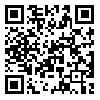Volume 7, Issue 3 (2019)
CLRJ 2019, 7(3): 126-149 |
Back to browse issues page
Download citation:
BibTeX | RIS | EndNote | Medlars | ProCite | Reference Manager | RefWorks
Send citation to:



BibTeX | RIS | EndNote | Medlars | ProCite | Reference Manager | RefWorks
Send citation to:
pirani M. A Research on the origin of the parable of Mathnavi and Hadighe “Elephant and blind men”. CLRJ 2019; 7 (3) :126-149
URL: http://clrj.modares.ac.ir/article-12-13750-en.html
URL: http://clrj.modares.ac.ir/article-12-13750-en.html
university
Abstract: (7697 Views)
Using of parables was common to explain and teach their aims thoughts in ancient times intentions among some ethnic groups. According to Resources, this tradition was of the Hindu principles of the Buddha's teachings and through them spread among other cultures. The parable of the" blind men and the elephant" is probably the most widely known and the most loved of all the world's parables. By far the earliest version of this parable is to be found in the Udàna, and is attributed to the Buddha (Ud.67-9). The parable's appeal is due to how well it makes its point, its striking juxtaposing of man and beast and its gentle humor. The background to the Buddha telling this parable is that referred in the article.In all cases the parable is about the "human physical senses inability to understand the facts of things,” This parable is known among Hindus as the "cell rule, blind" so as a proverb. The article, with the approach of comparative literature, allegory to the roots and origins of the Persian and Arabic texts Search. Its origin has been fund in Hindi and Buddhist sources, in a collection called "UDANA". This collection contains the words and teachings of the Buddha to the followers. This fable in the life of more than two thousand and five hundred years of its travel route has seen many changes. Poets and writers, according to his mental and cultural system, made benefit use of it and some changes on it.
Article Type: Research Paper |
Subject:
Pathology of Schools and Approaches to Adaptive Literature
Received: 2018/01/4 | Accepted: 2019/09/1 | Published: 2019/09/1
Received: 2018/01/4 | Accepted: 2019/09/1 | Published: 2019/09/1
| Rights and permissions | |
 |
This work is licensed under a Creative Commons Attribution-NonCommercial 4.0 International License. |








